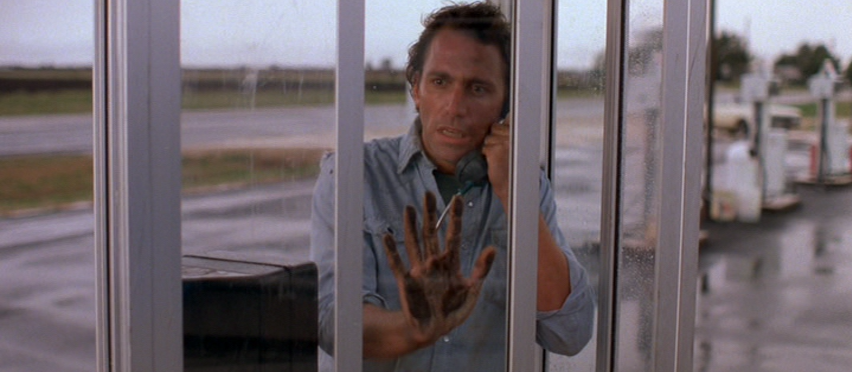
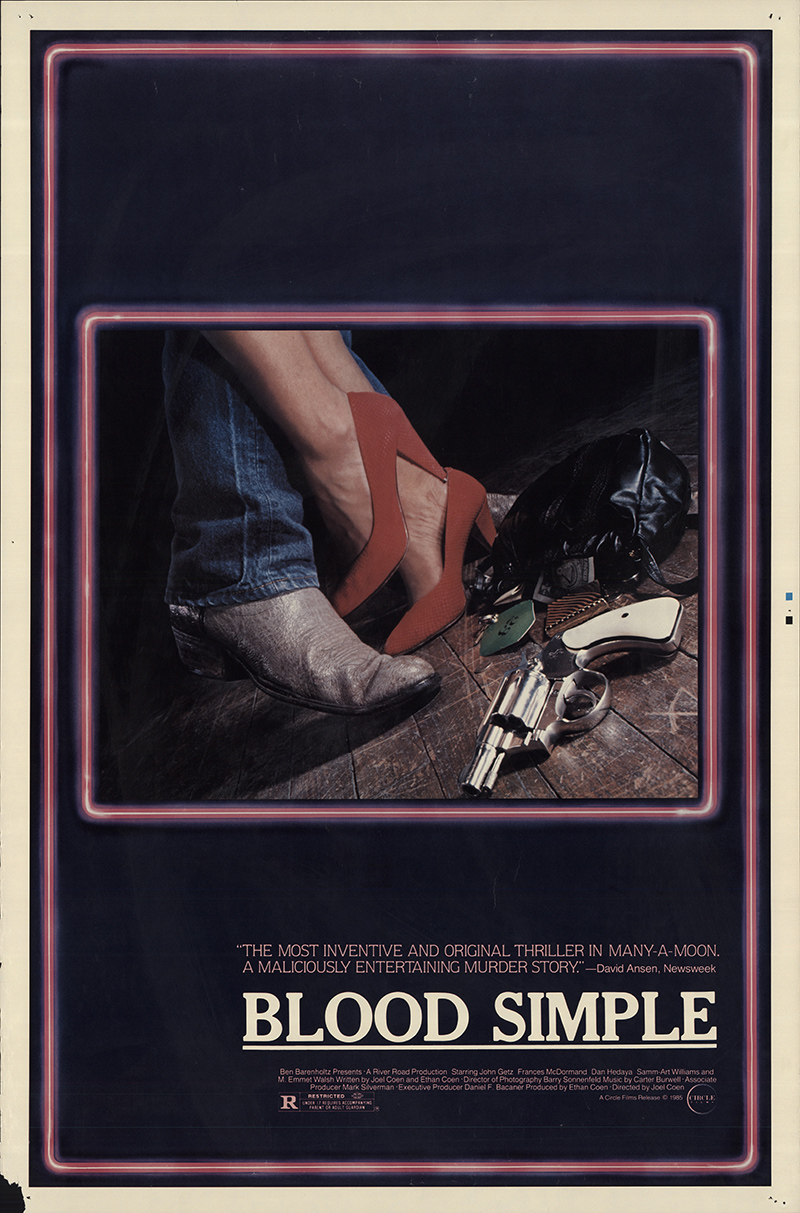
“Now, in Russia, they got it mapped out so that everyone pulls for everyone else… that’s the theory, anyway. But what I know about is Texas, and down here… you’re on your own.”
The Coen brothers’ first feature film is much darker in tone than their subsequent efforts. Once they found their niche, their brand of thriller-comedy became unmistakably their own, but here—coming off editing Sam Raimi’s debut The Evil Dead—things are bleak. Make no mistake, though—Blood Simple is a promising debut, and shows many of the burgeoning tendencies of the auteur pair. It’s just that the stark narrative is uncharacteristically dark—more depressive than absurdist or subversive, which became their hallmarks; and the protracted, witty dialogue and offbeat inanity of their later films is barely hinted at here.
Blood Simple is one of those films where you constantly feel the need to talk to the characters in an effort to keep them from the obvious harm that will come to them. If you pay careful attention to the plot, the slight twist at the end isn’t a surprise, but it is easy to be fooled into forgetting that we know more than the characters do. It basically pushes Hitchcock’s ‘bomb theory’ to its max. The film’s story is simple: a sleazy bar owner hires a “private investigator” to murder his wife and her lover (who happens to be one of his bartenders). From the start things go awry. The four principal characters forge ahead as best as they can with their limited knowledge, but are almost always making choices based on incorrect information. Sometimes they are in the dark because of chance and happenstance, but much of the time they are communicating with each other dishonestly. The mistrust amongst the characters leads to interpersonal stalemates that are exploited by the filmmakers for maximum tension.
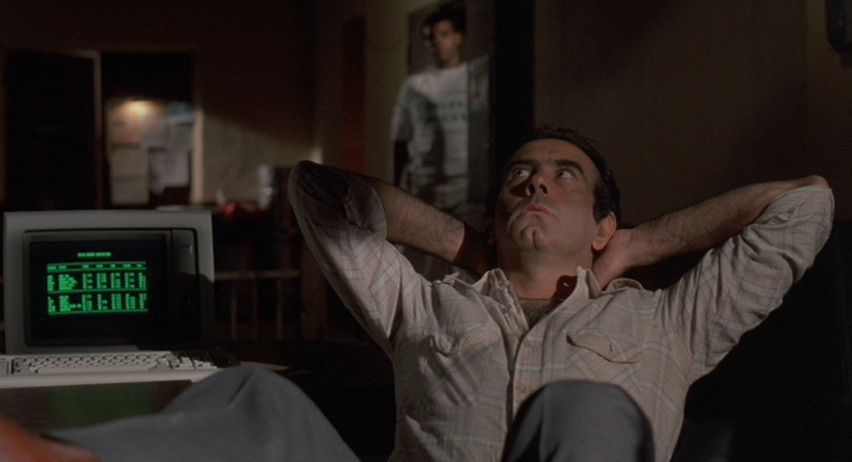
The film begins with Abby (Frances McDormand) and Ray (John Getz) driving through the rain, discussing Abby’s failing marriage to Marty (Dan Hedaya). McDormand plays Abby as a believable character, her actions determined as much by her emotionally distant and cruel husband as by herself.
One method that the Coens routinely employ (usually but not always for comedy) is to have repeated dialogue throughout the film, such as the sales pitch for the hula hoop in The Hudsucker Proxy, and Walter continuously bringing up Vietnam in The Big Lebowski. Here, Ray tells Abby multiple times that he is not a marriage counselor, a line that will crop up later in the mouth of Marty.
As they are driving, Ray stops in the middle of the road, suspicious of the car behind them. They go to Ray’s place for the night, where Visser (M. Emmet Walsh) photographs them sleeping together, later delivering the pictures to Marty at his bar. After Marty tries and fails to intervene and kidnap Abby from Ray’s house himself, he returns to Visser in humiliation and offers him ten grand to kill Abby and Ray. Visser is the most memorable character here—indifferent to the sheen of sweat that glistens on his face or the flies that land there in uncomfortable close-ups.
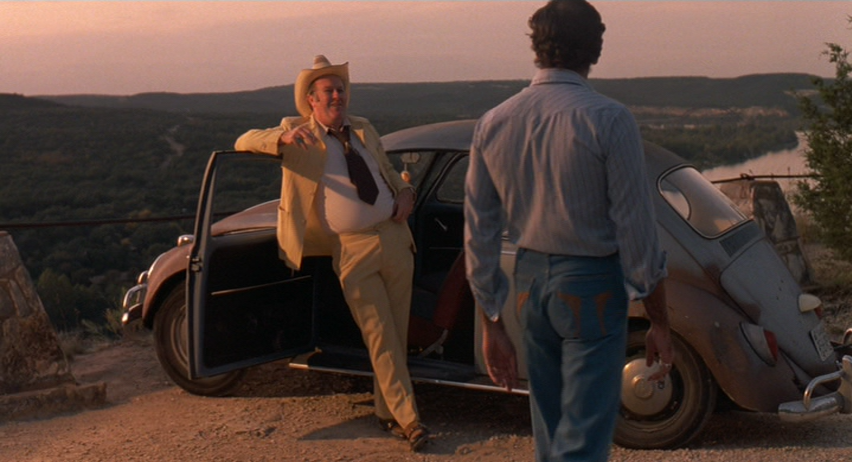
Outside of a classroom, there is little point in walking through the surprisingly intricate story. While the elevator pitch for the film is concise, the execution is complex and carefully constructed, and is compelling even on repeated viewings. Essentially, it is a series of scenes where the central characters misunderstand what they have seen, and react based on that misunderstanding which leads to increasingly catawampus situations. For instance, when Ray finds Marty dead in his office, with Abby’s gun on the floor next to him, he assumes that Abby killed Marty, which compels him to cover up her tracks and lug Marty’s corpse out into the country to bury him in a corn field. But Abby didn’t kill Marty; Marty’s not even dead.
The repetitious dialogue pops up again when Ray questions Abby about the incident. “I don’t know what you’re talkin’ about,” she says. “I mean, what are you talking about? I haven’t done anything funny.” Earlier, in the same scene that the “marriage counselor” line is repeated by Marty, he also warns Ray to stay away from Abby. “I had you two followed, because if it’s not you she’s sleeping with, it’s someone else. And what’s really gonna be funny, is when she gives you that innocent look and says, ‘I don’t know what you’re talkin’ about, Ray, I ain’t done anything funny.’” It’s humorous because the advice had been given to Ray—by Abby’s husband—to detect when she began cheating on him; but instead of that situation playing out, she says the line innocently—having actually not done anything funny—and Ray believes that means she is guilty of murder.
The idea of forming an entire narrative around a handful of people who don’t have a complete picture of the situation is one that the Coens revel in. They have used the idea multiple times in films like Fargo and No Country for Old Men. The latter also features the duo’s trick of keeping characters physically separate from each other for the entire runtime even though they are linked within the story, which was first executed in Blood Simple.
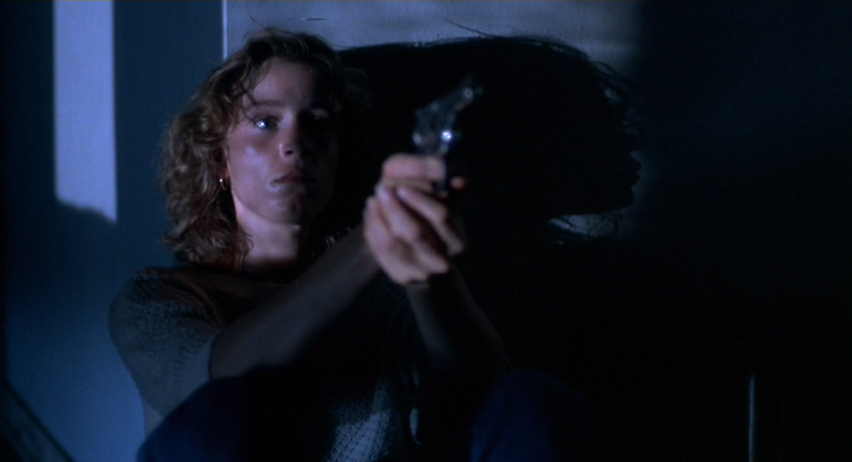
The humor that colors many of the Coens best films is subtler here, and potentially easy to miss. For instance, when Visser accidentally leaves his lighter in Marty’s office, under the fish that Marty brought back as his alibi for being out of town during the murders, the clue is almost literally a red herring. At one point there is a tracking shot across the surface of the bar, lifting itself over the sleeping head of a passed out drunk. When Abby shoots Visser through her apartment door (after a gruesome and comedic game of cat and mouse), she calls out to tell Marty—whom she thinks has attacked her, but who has actually been dead for some time—that she isn’t scared of him. Visser replies with a laugh, “Well, ma’am, if I see him I’ll sure give him the message.”
The small cast is excellent. Dan Hedaya plays Marty as a shady sleazeball, and John Getz and Frances McDormand are own their characters as well. The real star, though, is M. Emmet Walsh as the seedy private detective. It’s not my favorite Coen brothers film, but it is more than just a historically interesting artifact from filmmakers who went on to bigger and better. It requires a little bit of a stomach, but its rich and detailed plot along with solid acting make it a compelling thriller.